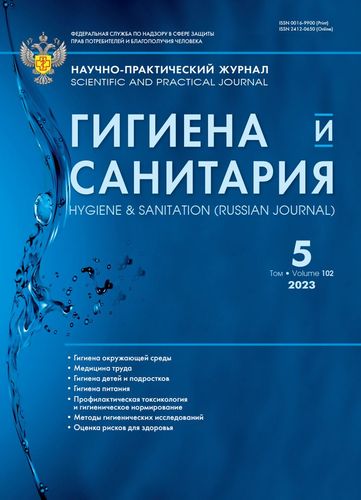The personalized operational control of the functional state in railway transport workers
- Authors: Bogdanova V.E.1, Zhovnerchuk E.V.1,2, Kostenko N.A.1, Serikov V.V.1,3
-
Affiliations:
- N.F. Izmerov Research Institute of Occupational Medicine
- Academy of Postgraduate Education of the FMBA of Russia
- Russian Medical Academy of Continuing Professional Education
- Issue: Vol 102, No 5 (2023)
- Pages: 462-465
- Section: OCCUPATIONAL HEALTH
- Published: 23.06.2023
- URL: https://edgccjournal.org/0016-9900/article/view/638564
- DOI: https://doi.org/10.47470/0016-9900-2023-102-5-462-465
- EDN: https://elibrary.ru/vcsjcp
- ID: 638564
Cite item
Full Text
Abstract
Introduction. One of the important directions of medical and psychological research is the scientific search for approaches and research methods in the field of adaptive resources of the individual necessity to maintain optimal performance and successful functioning of a specialist in occupational activity. At the present stage, the indicators of the functional state of the employee are taken into account and analyzed according to average values, without taking into account personalized data. This approach may lead to inaccuracies in the interpretation of the results obtained.
The purpose of the study is to determine the most significant criteria for assessing the functional state of railway transport workers based on the analysis of the database of the automated system of pre-trip medical examinations (KAPD-01-ST complex, ASF), taking into account the previously established individual threshold values of their current functional state indicators.
Materials and methods. As part of the work, the database of the system of pre-trip medical examination of four hundred employees of locomotive crews was analyzed. Among them, 200 people (according to the assessment of their psychophysiological state) were classified as a “risk group”. The average age (not included in the “risk group”) is 51.4 ± 2.8 years; those included in the “risk group” — 51.6 ± 3.5 years.
Results. According to the results of factor analysis (CMO = 0.737, Barlett sphericity criterion p<0.05), 5 factors were identified. The cumulative percentage on the last component is 94.723. Based on the study of the results of the automated system of pre-trip medical examination (ASP), the most significant indicators of assessing the functional state of employees of locomotive crews of railway transport in the formation of a “risk group” were identified.
Limitations. The representativeness of the sample size was ensured by the participation of 400 employees of locomotive crews in the study. The limitations of the study are related to the distribution of respondents by gender: there are no female respondents in the sample.
Conclusion. The previously applied approaches of the system, the assessment of the functional state of the employee according to group criteria, taking into account the average values, do not allow today to obtain a forecast of occupational reliability that meets modern requirements. There is an obvious need to create a new, more objective assessment system of the degree of overstrain of the functional systems of the human body, aimed at taking into account the individual characteristics of the operator professions.
Compliance with ethical standards. This study was carried out in accordance with the rules of good clinical practice and the Helsinki Declaration, and did not require the conclusion of the ethics committee.
Contribution:
Bogdanova V.E. — research concept and design, writing the article;
Zhovnerchuk E.V. — data analysis and interpretation, editing the article;
Kostenko N.A. — data analysis and interpretation, editing the article;
Serikov V.V. — data processing and interpretation.
All authors are responsible for the integrity of all parts of the manuscript and approval of the manuscript final version.
Conflict of interest. The authors declare no conflict of interest.
Acknowledgement. The study had no sponsorship.
Received: March 28, 2023 / Accepted: May 31, 2023 / Published: June 20, 2023
About the authors
Valentina E. Bogdanova
N.F. Izmerov Research Institute of Occupational Medicine
Author for correspondence.
Email: noemail@neicon.ru
ORCID iD: 0000-0002-7123-4117
Russian Federation
Evgeny V. Zhovnerchuk
N.F. Izmerov Research Institute of Occupational Medicine; Academy of Postgraduate Education of the FMBA of Russia
Email: zheviy@ya.ru
ORCID iD: 0000-0002-7078-7238
MD, PhD, DSci., Senior Researcher at the Academician N.F. Izmerov Research Institute of Occupational Medicine, Moscow, 105275, Russian Federation.
e-mail: zheviy@ya.ru
Russian FederationNataliya A. Kostenko
N.F. Izmerov Research Institute of Occupational Medicine
Email: noemail@neicon.ru
ORCID iD: 0000-0001-6290-6586
Russian Federation
Vasiliy V. Serikov
N.F. Izmerov Research Institute of Occupational Medicine; Russian Medical Academy of Continuing Professional Education
Email: noemail@neicon.ru
ORCID iD: 0000-0001-7523-4686
Russian Federation
References
- Bodrov V.A. Methods and means of improving the efficiency of the flight crew. Voenno-meditsinskiy zhurnal. 1983; (11): 40–4. (in Russian)
- Bessonova Yu.V., Oboznov A.A., Zankovskiy A.N., Akimova A.Yu. Psychological vulnerabilities of advanced driver assistance systems usage. Institut psikhologii Rossiyskoy akademii nauk. Organizatsionnaya psikhologiya i psikhologiya truda. 2012; 6(3): 38–77. https://doi.org/10.38098/ipran.opwp_2021_20_3_003 https://elibrary.ru/utlkwj (in Russian)
- Kotik M.A. About intentional and unintentional errors of the human operator. Psikhologicheskiy zhurnal. 1993; 14(5): 34–41. (in Russian)
- Kotik M.A., Emel’yanov A.M. The Nature of Human Operator Errors [Priroda oshibok cheloveka-operatora]. Moscow: Transport; 1993. (in Russian)
- Lomov B.F., Myasnikov V.I. Medical and psychological aspects of cosmonaut’s professional training. Psikhologicheskiy zhurnal. 1988; 9(6): 65–72. https://elibrary.ru/safqgt (in Russian)
- Noskova O.G., Devishvili V.M., Klimov E.A., Oboznov A.A., Solntseva G.N., Velichkovskiy B.B. Engineering Psychology and Ergonomics [Inzhenernaya psikhologiya i ergonomika]. Moscow; 2018. (in Russian)
- Oboznov A.A., Zhuravlev A.L. Actual Problems of Labor Psychology, Engineering Psychology and Ergonomics [Aktual’nye problemy psikhologii truda, inzhenernoy psikhologii i ergonomiki]. Moscow; 2018. https://doi.org/10.38098/ergo.2021 https://elibrary.ru/ltmuht (in Russian)
- Leonova E.V., Oboznov A.A., Chernetskaya E.D. Psychophysiological support of professional reliability of the personnel of organizations of the state corporation “Rosatom”. Institut psikhologii Rossiyskoy akademii nauk. Organizatsionnaya psikhologiya i psikhologiya truda. 2021; 6(1): 222–9. https://elibrary.ru/jzntpy (in Russian)
- Petrovich D.L., Oboznov A.A., Kozhanova I.V. Professional demand as a factor of professional psychological well-being. Institut psikhologii Rossiyskoy akademii nauk. Organizatsionnaya psikhologiya i psikhologiya truda. 2018; 3(4): 115–28. https://elibrary.ru/yteowt (in Russian)
- Smirnov V.M. Information Display Systems. Engineering Psychology [Sistemy otobrazheniya informatsii. Inzhenernaya psikhologiya]. Moscow: Lan’; 2020. (in Russian)
- Fugelova T.A. Engineering Psychology [Inzhenernaya psikhologiya]. Moscow: Yurayt; 2019. (in Russian)
Supplementary files









